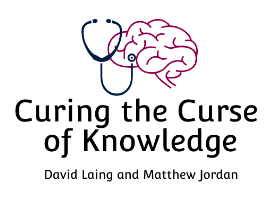Lesson 5: Seek Feedback
Hello and welcome to the final lesson in Curing the Curse of Knowledge! Today, we discuss the most important thing you must do to overcome the Curse of Knowledge: seek feedback.
Imagine you are working on a piece of writing, and you’re following all of our advice from the previous lessons. You’re convinced the Curse of Knowledge is a problem. You consciously separate the thinking phase from the communication phase. You imagine a specific person as your reader to jumpstart your empathy. You design your explanations from the bottom up, using concrete examples to illustrate abstractions. And you write active sentences by unpacking long noun phrases.
Is it time to publish? Probably not. No matter how well you followed these steps, you are limited by the fact that nobody has seen your writing except you. The Curse of Knowledge is not fully curable, so there will inevitably be parts of your work that confuse your readers. You can only identify these parts by showing your writing to someone else. Which brings us to today’s central message: to write as clearly as possible, you cannot write alone. You must seek feedback.
You likely don’t need convincing that feedback is useful. Making great things is hard, and many minds are better than just one. But we are making a stronger point: no one can actually write clearly on their own. To produce clear writing, feedback is more than just useful; it’s necessary.
A clear piece of writing is not just one that readers can understand. It’s one that readers do understand, effortlessly, on their first try. Reading a clear piece of writing does not feel like work. It feels like you’re in conversation with a trusted friend. It is one of life’s great joys.
A piece of writing like this can only be produced with an immense amount of feedback. Take these emails for instance. The process for writing each 1000-word lesson involves many rounds of feedback:
- Before we start drafting, we speak on the phone, taking notes and developing a rough outline.
- One of us writes the first draft.
- The other revises the draft, which always involves adding, removing, and rearranging multiple sections.
- We both leave comments and make additional revisions. Some sentences are rewritten dozens of times.
- Once we have a polished draft, we receive a rigorous round of edits from David’s partner, Meg. No matter how good we think our lesson is, Meg points out ways we can improve nearly every sentence and paragraph.
- We incorporate Meg’s feedback to produce a final draft.
- After publication, we receive feedback from readers like you, and we make notes on how to improve the lesson for next time.
It is no exaggeration to suggest that 80% of our work on a lesson takes place after the first draft has been written. There’s a popular saying: “Writing is rewriting.” We’d like to make an addition: “Writing is rewriting in response to feedback.”
When approaching someone for feedback, what specifically should you ask for? A common approach is to ask, “How can I make this better?” This question is better than nothing, but it puts your editor in an unnatural frame of mind. They’ll be so focused on evaluating your writing that they’ll be too distracted to absorb the content.
A better question is, “What are your reactions to this?” Rather than putting your editor in the red-inked mindset of a writing teacher, this question puts them in the position of your future readers. If they find your writing boring or confusing, they can simply report the truth. This will reveal so much information about your future readers’ experience that you will know exactly what you need to change.
One warning: it is often easy to dismiss your editor’s feedback. You’ll be tempted to think, “They just didn’t read that right” or, “Most people won’t be confused by that”. Try to resist this temptation. When someone tells you something is unclear, believe them. Because of the Curse of Knowledge, you are the worst judge of which aspects of your writing are confusing.
The final point we want to make in this course is that writing is a team sport. You should not only seek feedback on your own writing; you should join partnerships, groups, or communities that allow you to give feedback on other people’s writing. Giving regular feedback to others keeps you attuned to the qualities of clear writing, and it helps you build relationships with people who care about writing. These people, of course, give the best feedback.
In the interest of practicing what we preach, we would love for you to tell us: what were your reactions to this course? If you could spare three minutes to respond to this survey, we would be grateful for your feedback.
Thank you for reading our lessons and working to hone your craft as a writer. Clear writing makes the world a better place.
